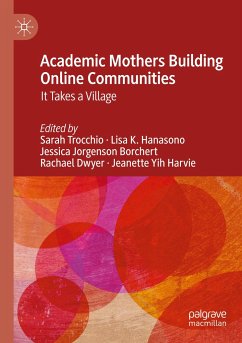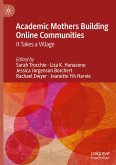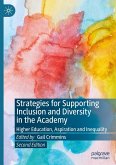Academic Mothers Building Online Communities
It Takes a Village
Herausgegeben:Trocchio, Sarah; Hanasono, Lisa K.; Borchert, Jessica Jorgenson; Dwyer, Rachael; Harvie, Jeanette Yih
Academic Mothers Building Online Communities
It Takes a Village
Herausgegeben:Trocchio, Sarah; Hanasono, Lisa K.; Borchert, Jessica Jorgenson; Dwyer, Rachael; Harvie, Jeanette Yih
- Broschiertes Buch
- Merkliste
- Auf die Merkliste
- Bewerten Bewerten
- Teilen
- Produkt teilen
- Produkterinnerung
- Produkterinnerung
This volume focuses on the diverse ways in which mothers working within academia seek to find others with similar experiences to build virtual communities. Although the faculty and student populations of universities have diversified, mothers in academia are disproportionately overrepresented in precarious faculty and staff positions and continue to experience myriad institutional and interpersonal barriers, such as gender wage gaps that are exacerbated by stop-the-clock tenure policies, inadequate parental leave policies, expensive or scarce local childcare options, and social biases. The…mehr
Andere Kunden interessierten sich auch für
![Academic Mothers Building Online Communities Academic Mothers Building Online Communities]() Academic Mothers Building Online Communities119,99 €
Academic Mothers Building Online Communities119,99 €![Education and Technology in the 21st Century: Education and Technology in the 21st Century:]() Wanda L. BryantEducation and Technology in the 21st Century:25,99 €
Wanda L. BryantEducation and Technology in the 21st Century:25,99 €![Equality and Differentiation in Marketised Higher Education Equality and Differentiation in Marketised Higher Education]() Equality and Differentiation in Marketised Higher Education75,99 €
Equality and Differentiation in Marketised Higher Education75,99 €![Internationalization and the Academic Profession Internationalization and the Academic Profession]() Internationalization and the Academic Profession119,99 €
Internationalization and the Academic Profession119,99 €![Internationalization and the Academic Profession Internationalization and the Academic Profession]() Internationalization and the Academic Profession119,99 €
Internationalization and the Academic Profession119,99 €![Equality and Differentiation in Marketised Higher Education Equality and Differentiation in Marketised Higher Education]() Equality and Differentiation in Marketised Higher Education75,99 €
Equality and Differentiation in Marketised Higher Education75,99 €![Strategies for Supporting Inclusion and Diversity in the Academy Strategies for Supporting Inclusion and Diversity in the Academy]() Strategies for Supporting Inclusion and Diversity in the Academy127,99 €
Strategies for Supporting Inclusion and Diversity in the Academy127,99 €-
-
-
This volume focuses on the diverse ways in which mothers working within academia seek to find others with similar experiences to build virtual communities. Although the faculty and student populations of universities have diversified, mothers in academia are disproportionately overrepresented in precarious faculty and staff positions and continue to experience myriad institutional and interpersonal barriers, such as gender wage gaps that are exacerbated by stop-the-clock tenure policies, inadequate parental leave policies, expensive or scarce local childcare options, and social biases. The book gives space to the many ways women create and challenge their own versions of motherhood through a digital "village," examining how academic mothers use virtual communities to seek and enact different kinds of support.
Produktdetails
- Produktdetails
- Verlag: Palgrave Macmillan / Springer International Publishing / Springer, Berlin
- Artikelnr. des Verlages: 978-3-031-26667-6
- 2023
- Seitenzahl: 388
- Erscheinungstermin: 9. Juni 2024
- Englisch
- Abmessung: 210mm x 148mm x 21mm
- Gewicht: 501g
- ISBN-13: 9783031266676
- ISBN-10: 3031266676
- Artikelnr.: 70940262
- Herstellerkennzeichnung Die Herstellerinformationen sind derzeit nicht verfügbar.
- Verlag: Palgrave Macmillan / Springer International Publishing / Springer, Berlin
- Artikelnr. des Verlages: 978-3-031-26667-6
- 2023
- Seitenzahl: 388
- Erscheinungstermin: 9. Juni 2024
- Englisch
- Abmessung: 210mm x 148mm x 21mm
- Gewicht: 501g
- ISBN-13: 9783031266676
- ISBN-10: 3031266676
- Artikelnr.: 70940262
- Herstellerkennzeichnung Die Herstellerinformationen sind derzeit nicht verfügbar.
Sarah Trocchio is Assistant Professor of Sociology and Criminology at Rider University, USA. Trocchio's research focuses on the mechanisms through which structural inequity is reflected, reinforced, or mitigated in varied workplace contexts. She is a nationally board certified coach in the USA, and owns her own career coaching and strategy practice called the Square Peg Club (SPC). Lisa K. Hanasono is Associate Professor in the School of Media and Communication and an affiliated faculty of the Women's, Gender and Sexuality Studies Program at Bowling Green State University, USA. She researches how people communicate social biases, shatter stigmas, and respond to discrimination. Jessica Jorgenson Borchert is Associate Professor of English, Director of Writing Across the Curriculum, and Director of Professional Writing at Pittsburg State University, USA. She has previously published on breastfeeding rhetoricand postpartum dress practices in academia. Rachael Dwyer is Lecturer in Curriculum and Pedagogy in the School of Education and Tertiary Access, University of the Sunshine Coast, Australia. Her scholarly work is underpinned by a social change agenda, engaging in arts-based research that allows for collaborative, applied work drawing on rich and longitudinal relationships with participants, students and the broader community. Jeanette Yih Harvie is a Research Associate with the D'Aniello Institute for Veterans and Military Families at Syracuse University, USA. She has published extensively on how public policy and political institutions impact the citizenship development and political behavior of military veterans and underrepresented racial/ethnic groups.
1. It Takes a Village: Academic Mothers Building Online Communities.- Part I Identity and Marginalization.- 2. How Finding Identity with an Online Community Led to Advocacy.- 3. (Un)Supported: Challenges and Opportunities Experienced by Academic Mothers of Color in Online Communities.- 4. Barefoot Strangers: Multinational Digital Epistemologies of Academic Moms, Mamás, Mamy, Umahat.- 5. Creating an Online Community of Support: Mothers of Children with Disabilities Working in the Academy.- 6. Who Is There When Everything Changes?: The Anchoring Effect of Online Maternal Support Groups During Periods of Liminal Professional Identity.- 7. How Academic Mothers Experience Face Threatening Acts and Reinforcing Facework on Instagram.- 8. #GradStudentMom Finds Community Online.- 9. Being Alone Together: The Affordances and Constraints of Social Media Groups for Single Moms.- Part II Connection and Support.- 10. Dealing with Death inAcademia, or When 11,000 Mamas* Had my Back.- 11. The Face(book) of Academic Motherhood: Online Communities Respond to the Traumatic and the Mundane.- 12. Hell Hath No Fury Like a Scorned Woman's Friend: Reflected Anger in Academic Mother* Online Groups.- 13. Online Groups as Source for Communication about the Taboo: Sexual Implications for Academic Mothers*.- 14. Social Support Theory: Physical Isolation and Academia with Children.- Part III Pandemic Parenting.- 15. Building Welcoming Spaces on Social Media: Motherhood in Academia During a Pandemic and Beyond.- 16. Drafting while Drifting: Developing a Digital Village of Support and Advocacy During the COVID-19 Pandemic.- 17. Building a Virtual Village: Academic Mothers'* Online Social Networking During COVID-19.- 18. The First Rule about Writing Group: How a Virtual Writing Group Changed My Trajectory Without Saying a Word.- 19. "Comedy and Tragedy," or How We Used Our Group Chat to Fill the Pandemic Care Gap.- 20. Kids at the Door: An Autoethnography of Our Shared Research Identity as Academic Mothers in Virtual Collaboration.
1. It Takes a Village: Academic Mothers Building Online Communities.- Part I Identity and Marginalization.- 2. How Finding Identity with an Online Community Led to Advocacy.- 3. (Un)Supported: Challenges and Opportunities Experienced by Academic Mothers of Color in Online Communities.- 4. Barefoot Strangers: Multinational Digital Epistemologies of Academic Moms, Mamás, Mamy, Umahat.- 5. Creating an Online Community of Support: Mothers of Children with Disabilities Working in the Academy.- 6. Who Is There When Everything Changes?: The Anchoring Effect of Online Maternal Support Groups During Periods of Liminal Professional Identity.- 7. How Academic Mothers Experience Face Threatening Acts and Reinforcing Facework on Instagram.- 8. #GradStudentMom Finds Community Online.- 9. Being Alone Together: The Affordances and Constraints of Social Media Groups for Single Moms.- Part II Connection and Support.- 10. Dealing with Death inAcademia, or When 11,000 Mamas* Had my Back.- 11. The Face(book) of Academic Motherhood: Online Communities Respond to the Traumatic and the Mundane.- 12. Hell Hath No Fury Like a Scorned Woman's Friend: Reflected Anger in Academic Mother* Online Groups.- 13. Online Groups as Source for Communication about the Taboo: Sexual Implications for Academic Mothers*.- 14. Social Support Theory: Physical Isolation and Academia with Children.- Part III Pandemic Parenting.- 15. Building Welcoming Spaces on Social Media: Motherhood in Academia During a Pandemic and Beyond.- 16. Drafting while Drifting: Developing a Digital Village of Support and Advocacy During the COVID-19 Pandemic.- 17. Building a Virtual Village: Academic Mothers'* Online Social Networking During COVID-19.- 18. The First Rule about Writing Group: How a Virtual Writing Group Changed My Trajectory Without Saying a Word.- 19. "Comedy and Tragedy," or How We Used Our Group Chat to Fill the Pandemic Care Gap.- 20. Kids at the Door: An Autoethnography of Our Shared Research Identity as Academic Mothers in Virtual Collaboration.








